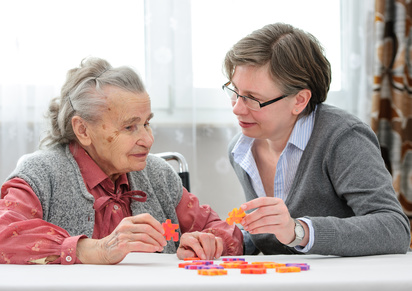With over 170,000 Kiwis expected to be living with dementia by 2050, cognitive decline is something that could become a reality for you or a loved one. With side effects like memory loss, confusion and mood swings, diseases like Alzheimer’s can put relationships on the line. And as conditions progress it can become easier and easier to forget that your loved one is still present.
That’s why it’s so important to approach dementia with a positive mindset. Whether you’re dealing with a lifelong partner, a beloved parent or a close friend, here are some powerful ways to remind yourself that while it may not always be obvious, your loved one is still well and truly alive.

Educate yourself
One of the first steps to becoming a better caregiver is to educate yourself about dementia. For example, if your loved one is suffering from Alzheimer’s it’s important to learn as much as you can about the symptoms and progression of the condition. This is a critical part of turning frustration and resentment into empathy and understanding.
Reset your expectations
While optimism is a powerful tool it’s also important not to set the bar too high. This means being realistic about expectations for both your loved one and yourself. You should also teach yourself to expect the unexpected, as it’s guaranteed to happen.
Don’t lose your sense of humour
There’s nothing funny about dementia, but talk to any seasoned caregiver and they’ll admit that in some scenarios all you can do is laugh. A sense of humour will help to keep you grounded and bring a touch of joy to moments that may seem hopeless.
Develop routines and schedules
As dementia progresses it’s more important than ever to introduce strict routines and schedules into the life of your loved one. This will help to minimise confusion and frustration, as well as help them to feel present and in control.
Resist the urge to argue
Dementia affects the brain which means that no matter how hard you try to rationalise with someone, chances are they simply won’t understand. Instead, adopt a calm and peace-loving approach that will mitigate stress and frustration for both you and your loved one.
Champion good nutrition
Over the years studies have linked Alzheimer’s to a host of lifestyle choices, including poor nutrition. For example, some experts suggest that sugar could play a role. While nothing is for certain there’s no harm in helping your loved one enjoy a healthy diet.
Empower them with independence
While it can be tempting to complete a task simply because it’s faster, empowering your loved one with independence can make all the difference.
Have fun!
Just because a loved one is suffering from dementia it doesn’t mean you can’t still have fun. Think about what they loved before they deteriorated and plan trips accordingly. From museums and art galleries to picnics and beach days, there’s no reason why you can’t spend quality time together.
Accept your loved one in the now
One of the hardest aspects of dementia is watching your loved one transform as a person. It’s perfectly normal to grieve the loss of the person they once were. But it’s also important to learn to love the person as they are in the now.
Ask for help
Whether your care duties are small or all-consuming, a big part of coping with dementia is learning to ask for help. You’re only human so if you need to chat with a friend, join a local support group or seek professional help, never underestimate the importance of a support network. Caregiver burnout is all too common so be sure to take care of yourself.
It’s not a death sentence
While the onset of dementia can be overwhelming, by no means is it a death sentence. Deterioration can be slow and many people often live for over 20 years following diagnosis. With this in mind be sure to make the most of the time you have with your loved one. If you’re finding it hard why not experiment with welcoming mindfulness into your everyday life?
Your words and actions matter
While short and long-term memory loss can be factors, people with dementia are still more than capable of feeling and recalling emotions. This means that every interaction matters, regardless of whether they’ll remember it later.
Anticipate deterioration
It can be incredibly hard to watch a loved one deteriorate before your eyes. Rather than blame mood and personality changes on the person themselves, remember that it’s simply the disease progressing.
Experiment with different mediums
While rational conversations may be off the cards, don’t forget that there are so many other ways to reach your loved one. From art and music to reading and singing, experimenting with different mediums can really help you to connect.
Do you have any experience with dementia? We’d love to hear about your coping techniques so go ahead and share with the GrownUps community.









Join the Discussion
Type out your comment here:
You must be logged in to post a comment.